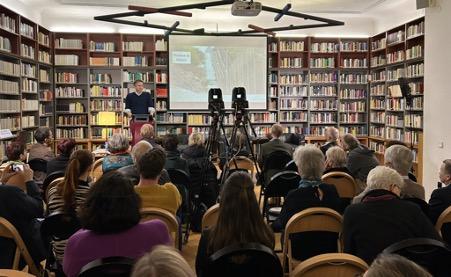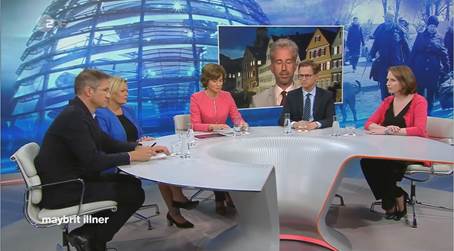Refugee continent – Olga in Paris – Turkish catastrophe
- Ukrainians and European solidarity
- Why Olga will not go to France
- Homes for Ukrainians across Europe?
- A European message to Putin: solidarity
- Where refugees get protection – a global view
- Turkish catastrophe
Dear friends,
In 2022 European democracies welcomed more refugees in one year than any other continent in recent decades. This has one principal cause: the Russian attack on Ukraine in February.
Here are the numbers. If we leave aside the descendants of Palestinians, who fled from Israel in 1948 and who are under the mandate not of the United Nations High Commissioner for Refugees, UNHCR, but of the United Nations Relief and Works Agency for Palestine Refugees in the Near East, UNRWA, then the total number of refugees under the mandate of UNHCR in the world at the end of 2017 stood at 19.9 million. At the end of 2021 it stood at 21.3 million.
The net increase in the number of refugees in the world under UNHCR's mandate was 1.4 million in four years.
Between 24 February and 31 December 2022, more than 4.6 million Ukrainians asked for temporary protection in the EU. More than 150,000 fled to the United Kingdom. More than 70,000 remained in Moldova. Within months, Russia's attack had triggered the biggest refugee movement in Europe since the 1940s, with many millions more displaced inside Ukraine. Today, Europe is the continent with most refugees in the world.
Net increase in number of refugees
Increase in number of refugees under UNHCR mandate,
in the world, in four years (2017-2021): 1.4 million
Ukrainian refugees in the EU, in ten months 2022: 4.6 million
More on the reality of refugee reception worldwide: Humane borders and the future of the refugee convention.
Ukrainians and European solidarity
The war in Ukraine is still ongoing and the biggest displacement crisis in Europe since the 1940s is far from over. A new ESI paper looks at one of the most striking aspects of this historic refugee movement. With free choice where to go in the European Union, Ukrainian refugees have overwhelmingly chosen not to go to some of the biggest European countries:
Olga in Paris
Why are there so few Ukrainian refugees in France?
14 February 2023
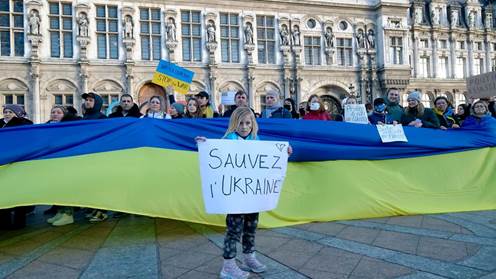
This builds on analysis ESI published in December 2022 on how Europeans might respond to a historic refugee winter:
ESI newsletter – Homes for Ukrainians – a plan for winter
29 December 2022
On 4 March 2022, the EU ministers of interior activated the so-called Temporary Protection Directive. As a result, Ukrainian citizens and their family members could apply to be granted temporary protection without an asylum procedure. EU-member states committed themselves to offer them residency rights, access to the labour market, access to housing, social welfare assistance, medical or other assistance, and “means of subsistence.” Temporary protection was granted for an initial period of one year. On 10 October 2022, Ylva Johansson, the European Commissioner for Home Affairs, announced after a meeting that “the Temporary Protection Directive will continue to be in place at least until March 2024.”
So where did Ukrainian refugees find protection? Czechia and Poland received the highest number per capita: more than 4 percent of their population. Another six countries received applications amounting to 2 or more percent.
2 percent and above – Ukrainians and temporary protection (24 January 2023)
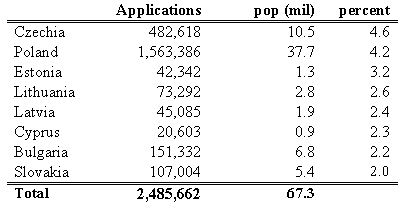
Another 1.2 million applications were submitted in four countries: Ireland, Germany, Luxembourg, and Austria received applications equivalent to 1 to 2 percent of their population.
Below 1 percent – Ukrainians and temporary protection (24 January 2023)
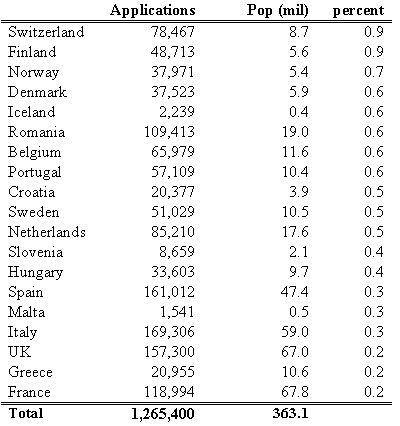
These are remarkable numbers: more Ukrainians applied for protection in the Czech Republic (11 million inhabitants) than in France, Italy and Spain combined (174 million inhabitants). More Ukrainians applied for protection in Bulgaria (with a population of 7 million) than in France (population 68 million).
But why are there so few Ukrainian applications in France (or Spain, or Italy)? What factors explain this uneven distribution of temporary protection applications?
One obvious factor is geographical proximity. Many Ukrainians preferred to stay close to their country. The number of Ukrainians in Poland and Slovakia alone is 1.7 million. This is more than a third of the total number of temporary protection applications. Proximity matters, but it is not everything. Two neighbours of Ukraine – Hungary and Romania – have received far fewer applications: Hungary (with a population of 10 million) received fewer than Latvia (with a population of 2 million).
Language matters. Among the top 8 countries are four where a Slavic language is spoken: Czechia, Poland, Bulgaria, Slovakia. Another three (the Baltic states) contain a significant number of Russian speakers. These seven countries account for 2.5 million applications, more than half the total. The only outlier among the top 8 is Cyprus.
Geography and language are givens. A third factor, however, is a matter of political decisions: the support offered to Ukrainian refugees and private households which are prepared to host them. It is this third factor that explains some striking numbers.
Why Olga will not go to Paris
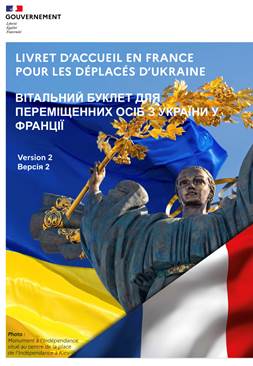
In 6 months, from July 2022 to January 2023, some 27,000 Ukrainian refugees arrived in France and 352,000 in Germany. The state of Baden-Württemberg (population 11 million), bordering France, is hosting more Ukrainians than all of France. Why?
Imagine a Ukrainian mother and her 13-year-old son, crossing the EU border this winter in search of temporary protection. Let us call them Olga and Serhii. Like many Ukrainians, Olga speaks Ukrainian, Russian, and some English. Then Olga learns that France has one of the lowest per capita numbers of Ukrainian refugees in Europe.
Olga types “Україна біженці Франція” (Ukraine refugees France) into google. This takes her to a French government site in Ukrainian, which promises “all useful information for displaced people in Ukraine”: https://www.gouvernement.fr/info-ukraine/accueil-des-refugies-version-ukrainienne. The text starts:
“You have arrived from Ukraine, welcome to France. The French population, the State, local authorities and associations are fully mobilised to welcome and support you. This portal aims to provide you with the information you need for your stay in France and to access your rights.”
A hyperlink takes her to a map of France with registration points. She checks links on the map. Most links lead to sites which are in French only. Eventually she gets to a link sur le site du ministère de l'Intérieur, the site of the Ministry of Interior. It is, again, in French only, but here Olga spots a link to a “Welcome booklet in France for displaced persons from Ukraine”, a 56-page bi-lingual publication.
WELCOME BOOKLET IN FRANCE
FOR DISPLACED PERSONS FROM UKRAINE
Under the heading “Allowances” there is one paragraph (and no link). How much help she and her son might receive in France is not explained. Information on accommodation leaves Olga confused. There is little information on costs of, or social support for, rent (and no link).
Reading through the leaflet, however, Olga does not get any sense of how she might live in France, what social support will would get, and how she might be able to rent a place to live.
Olga tries to contact Ukrainians already in France via social media. She then learns that, once granted temporary protection, Ukrainians are not in the same position as other recognised refugees in France, getting significantly less social support.
For a single person, the social allowance is € 204 per month (€ 6.80/day), for two persons it is € 306 per month (€ 10.20/day). In addition, Olga can apply for € 222 in rent support, if she has not been provided with free housing of any kind.
France: Social support per month

Olga then talks to someone who has chosen to go to Germany. The contrast is stark.
In Germany, Olga and her son Serhii would receive monthly social support of € 850. In addition, she would get rental and heating costs, up to € 740 if she rents an apartment of 65 m². It includes € 122 costs for heating, which is a maximum amount. The exact amount depends on the heating system used. This is three times the amount she would receive in France.
Germany: Social support per month
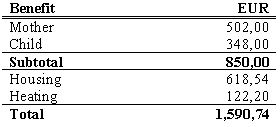
How likely is it that Ukrainians who might arrive in the European Union in the coming months will take a train and head to France, rather than stay somewhere on the East side of the Rhine?
From July 2022 to end January 2023 the number of Ukrainians who applied for temporary protection in France increased from 92.000 to 119.000. During the same time, the number in Germany went from 670,000 to 1,022,000.
Homes for Ukrainians across Europe?
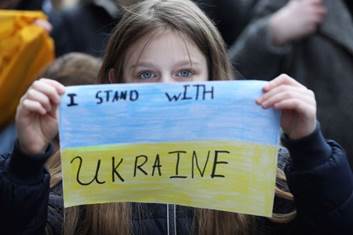
Welcoming Ukrainians in Dublin
In March 2022, Ireland declared that it was ready to accept up to 100,000 refugees fleeing the war in Ukraine. Ireland introduced a generous Accommodation Recognition Payment for hosting refugees from Ukraine (ARP):
“The Accommodation Recognition Payment (ARP) is a tax-free payment of €800 per month for each property used to provide accommodation to refugees from Ukraine … The accommodation must be provided for at least 6 months and meet the required standards.“
In recent month, the German NGO Alliance4Ukraine and ESI have launched a campaign for such a scheme to be introduced in Germany and in other European countries: a Dankespauschale / Thank You Payment of €500 per month per hosting household, to be paid for renewable 4 or 6 months.
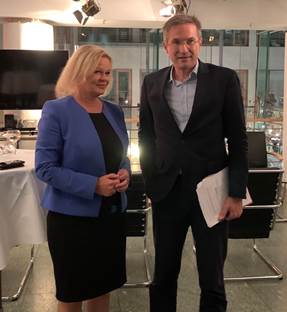
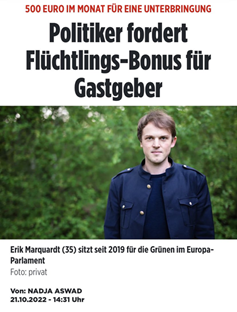
Making the case for German Thank you payments
The United Kingdom is an outlier among European countries, the one country Ukrainian refugees can only enter with a visa. With a population of 67 million, the UK took in just 0.2 percent of its population. This is more than France and Greece, but less than every other European Union member state. If the whole EU had acted like the UK, it would only have seen 1 million Ukrainian refugees enter.

Proposal for German Thank you Payment
Ukrainian visa-holding refugees also arrive in the UK via two schemes: the Ukraine Family Scheme and the Ukraine Sponsorship Scheme. The sponsorship scheme is also known as Homes for Ukraine. One aspect of the Homes for Ukraine programme is an inspiration to the rest of Europe: Thank you payments for hosting families of £350 (around €400) per month for hosting families.
According to a survey conducted by the Office of National Statistics in July 2022:
- Only 6 percent of UK hosts said they wanted the arrangement to last less than 6 months.
- 19 percent said they were happy with the arrangement to last the agreed 6 months.
- 24 percent said they wanted the arrangement to last between 6 and 12 months.
- 37 percent said they were happy for the arrangement to last 12 months or more.
Thank-you payments made a real difference:
“Of those who planned to provide accommodation for between 6 and 12 months, 7 in 10 said continued £350 monthly payments would encourage them to host for longer.”
In December 2022, the amount of Thank you payments increased to £500 a month “for guests who have been in the country for over a year … ‘Thank you’ payments will also be extended from 12 months to 2 years … where sponsors are willing to extend arrangements.”
A European message to Putin: solidarity
For European democracies to be prepared to cope with more Ukrainian refugees in 2023 such a programme would also be needed in France, Italy or the Netherlands, countries that have so far taken relatively few Ukrainian refugees.
If households in Lyon, Milan, Utrecht or Stockholm are ready to welcome Ukrainians, they should receive similar support from their governments. This would help ensure a more balanced distribution of refugees in 2023.
Could the European Commission, the Swedish EU-presidency, Germany, France, and the UK jointly organise a campaign for European Homes for Ukrainians, with national thank-you payments to households on the UK/Irish model? A public-private partnership to confront a historic refugee winter? A tangible expression of true European solidarity?
This would make sense for any country to introduce even on its own. There is an urgent need to support existing private hosts as local authorities are increasingly struggling across Germany to host more refugees. At the same time, a Europe-wide campaign that shows civil societies, backed by governments, prepared to host more Ukrainian refugees is a powerful signal to Russia and to its fifth column inside the EU that Putin's horrific blackmail will fail. Putin hopes to divide European societies. His instrument is terror against Ukrainian civilians. He must not succeed.
In the end, whether there will be 2 million, 10 million or 15 million Ukrainian refugees at the end of 2023 will depend on the success of Ukrainian resistance to Russia and on the military, financial and logistical support Ukraine receives from its allies: on more ammunition and air defense systems. On more generators and transformers. On battle tanks to address the “root cause” of Ukrainian mass displacement: Putin’s invading army.
However, until Ukraine can win its war, European states need to be ready to help those who seek safety.
Where refugees get protection – a global view
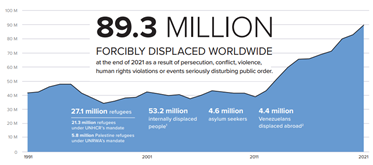
UNHCR, most recent Global Trends Report, summer 2022
From end 2017 to end 2021, the number of refugees in the world increased by 1.4 million. Two countries stand out globally: Germany and Turkey. Both are at the centre of the two biggest recent refugee crises in the world in half a century: the crisis in Syria, now aggravated by the deadliest earthquake in Turkey in a century, and the crisis in Ukraine.
UNHCR: increase in the number of refugees – top 20 countries
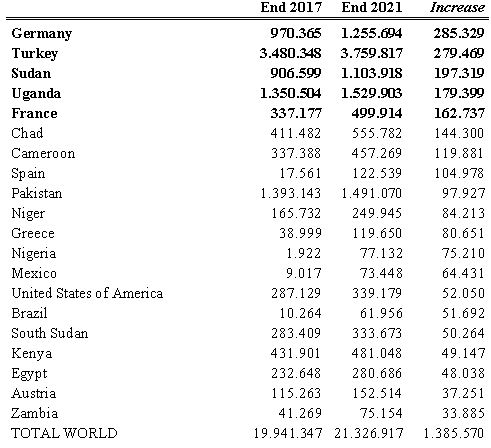
As we have seen, in 2022 these numbers have been dwarfed by the number of Ukrainian refugees met with generosity by many European countries. The same generosity was shown, following the outbreak of fighting in Syria in 2011, in Turkey. There too, millions of Syrians were able to enter without a visa and received temporary protection.
The enduring result of this policy is that Turkey remains the country in the world hosting the largest number of refugees. On 2 February 2023, there are 3,500,964 Syrians under temporary protection in Turkey.
Today, Turkey has the largest number of refugees of any country in the world, which accounts for over 4 per cent of its population of 85 million. In addition, between the end of 2017 and the end of 2021, Turkey had the largest increase in the number of refugees under the mandate of UNHCR, with a rise of approximately 280,000, second only to Germany.
At the same time, in February 2023 the deadliest earthquake in a century in Turkey has disproportionately affected a region that has offered more shelter to more refugees than any other in Europe in recent years.
Turkish catastrophe
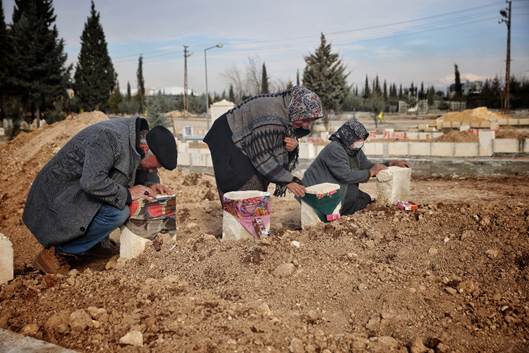
Victims of the earthquake in Turkey
Next to the challenge of handling potentially many more Ukrainian refugees, the issues of supporting these devastated refugee host communities in Turkey must today be at the top of the European political agenda.
The UN Refugee Compact, adopted with great fanfare by the United Nations General Assembly in late 2018, declared the need for solidarity of countries hosting refugees:
“Countries that receive and host refugees, often for extended periods, make an immense contribution from their own limited resources to the collective good, and indeed to the cause of humanity. It is imperative that these countries obtain tangible support of the international community as a whole in leading the response.”
No country has hosted more refugees in the past decade than Turkey. Almost half of the 3.5 million Syrians in Turkey are children (1.6 million or 47 percent). Almost half of these Syrian refugees also live in the eleven provinces most affected by two devastating earthquakes this month.
The top five Turkish provinces hosting Syrians are Istanbul, Gaziantep, Sanliurfa, Hatay, Adana. Many of these provinces have now been hit hardest by the biggest natural disaster in modern Turkish history. The 11 Turkish provinces most affected by this earthquake have a population of 15.6 million people. They are hosting 1.7 million Syrian refugees. This is 11 percent of their total resident population.
Turkish provinces most affected by the earthquake, (2 February 2023)
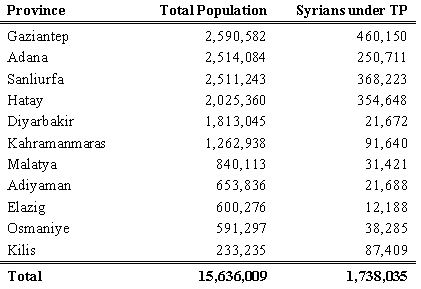
The EU has a lot of recent experience supporting Syrian refugees and host communities in Turkey, having successfully allocated 6 billion Euro for refugees there between 2016 and 2020.
What is needed now is a mobilisation of a similar nature for the next four years. This will require finding NEW money for a donor conference to be held in Brussels in March, funding that is proportionate to the scale of this disaster. It should help Turkish communities hosting Syrians, as well as the millions displaced inside Syria near the Turkish border:
- Reconstruction. About a quarter of the buildings in the affected region in Turkey are either destroyed or heavily damaged. This will require funding and technical assistance to support the reconstruction of homes, public infrastructure, and essential services, such as water and electricity, in affected communities.
- Social protection programs. The EU currently funds cash support and social protection programmes for the most vulnerable Syrian refugees in Turkey. Such a program should be continued, expanded and extended to include the most vulnerable Turkish citizens in the refugee host communities.
The Syrian refugee crisis and the Ukrainian refugee crisis have triggered the two biggest global refugee disasters since the early 1970s. This is not a new normal: it is a historic emergency, made worse by the consequences of this year’s devastating earthquakes.
Both crises pose massive challenges to European democracies, putting the European refugee protection system to an unprecedented test.
Yours sincerely,

Gerald Knaus
The European Stability Initiative is being supported by Stiftung Mercator
Further reading
NEW ESI Report
Olga in Paris - Why are there so few Ukrainian refugees in France?
ESI Newsletter
Putin’s Cholodomor – Homes for Ukrainians – A plan for winter
Op-ed (in German) in Die Zeit
Wer nur von Abschiebung spricht, der blendet
Noch nie hat Deutschland so viele Geflüchtete aufgenommen wie im vergangenen Jahr. Um dieser Aufgabe Herr zu werden, braucht es mehr als billige Versprechen.
This op-ed in English:
Those who only talk about deportation are missing the point
ESI recent news related to migration and refugees
Vienna – ESI at IWM: Presentation and debate on refugees and migration
VIDEO 2 February 2023
Vienna – ESI at Kreisky Forum: presentation and debate on migration and refugees
VIDEO 1 February 2023
Munich – ESI meets with the Bavarian State Minister of the Interior
31 January 2023
Berlin – ESI at public debate with Joachim Stamp on migration, democracy, and Islam
19 January 2023
Berlin – ESI presentation on borders and refugees at Katholische Akademie Berlin
VIDEO 14 December 2022
Salzburg – ESI presentation on refugees and migration
VIDEO 6 December 2022
ESI on refugees in the media
Süddeutsche Zeitung, Migration in die EU: "Eine historische Ausnahmesituation" ("Migration to the EU: "An exceptional historical situation".") Podcast with Gerald Knaus, 18 February 2023
Hessenschau, Flüchtlingsgipfel: So will Faeser den Kommunen helfen, ("Refugee summit: This is how Faeser wants to help the municipalities"), TV Interview with Gerald Knaus, 16 February 2023
ZDF, Enttäuschung nach Flüchtlingsgipfel, ("Disappointment after refugee summit")TV Interview with Gerald Knaus, 16 February 2023
ZDF, Markus Lanz vom 16. Februar 2023 ("Markus Lanz from 16 February 2023")
Gerald Knaus on German TV Debate Show Markus Lanz, 16 February 2023
Verlagshaus Jaumann, Europa und seine Flüchtlinge ("Europe and its refugees"), 15 February 2023
BILD, Migrations-Experte über Flucht-Bekämpfung: Waffen für die Ukraine statt Grenzzäune ("Migration expert on combating flight: Weapons for Ukraine instead of border fences"), 12 February 2023
RBB, Experte zur EU-Migrationspolitik: Deutschland muss aktiv werden, ("Expert on EU migration policy: Germany must become active"), Radio Interview with Gerald Knaus, 10 February 2023
WDR, Studiogespräch: Gerald Knaus, geflüchtetenpolitischer Experte der Europäischen Stabilitätsinitiative ("Studio discussion: Gerald Knaus, refugee policy expert of the European Stability Initiative"), TV Interview with Gerald Knaus, 10 February 2023
RTL, Kaum Wohnraum und vermutlich noch mehr Geflüchtete: Wo sind die Lösungen? ("Hardly any housing and probably even more refugees: Where are the solutions?"), 9 February 2023
VRT, Hekken of muur aan buitengrens EU? "Lijkt mij debat gebaseerd op wanhoop en symboliek" (" Fence or wall on EU external border? "Seems to me debate based on desperation and symbolism""), 9 February 2023
Phoenix, Phoenix runde: Die Erdbebenkatastrophe - Was sind die Folgen? ("Phoenix round: The earthquake disaster - What are the consequences?"), Gerald Knaus at German TV Debate, 8 February 2023
NOS, Gambiadeal doorbraak migratiedebat? ("Gambia deal breakthrough migration debate?"), TV Interview with Gerald Knaus, 8 February 2023
NOS, Gambiadeal kan doorbraak migratiediscussie zijn, hoopt Duitsland ("Gambia deal could be breakthrough migration debate, Germany hopes"), 8 February 2023
Puls 24, Migrationsexperte Knaus: Europäische Lösung im Moment eine Orbán-Lösung ("Migration expert Knaus: European solution an Orbán solution at the moment"), 8 February 2023
The Economist, The British government is planning another crackdown on asylum-seekers, 8 February 2023,
Der Standard, Die Sackgasse der EU bei Rückführungen, ("The EU's impasse on returns"), 7 February 2023
fd.nl, 'Je kunt beter met een klein groepje lidstaten migratiedeals sluiten', ("'Better to make migration deals with a small group of member states'"), 5 February 2023
WDR, Migration & Abschiebung: Zwei Seiten einer Medaille? ("Migration & Deportation: Two sides of the same coin?") Radio Interview with Gerald Knaus, 2 February 2023
Bundeszentrale für politische Bildung, Wie in Europa humane Grenzen mehrheitsfähig werden können, ("How humane borders can gain majority support in Europe") Article by Gerald Knaus, 2 February 2023
Deutsche Welle, Warum Abschiebungen aus Deutschland so schwierig sind ("Why deportations from Germany are so difficult"), 31 January 2023
De Standaard, ‘We moeten vechten tegen de krachten die het slechtste in ons naar boven halen’ ("We have to fight the forces that bring out the worst in us"), 21 January 2023
Profil, Verschwiegene Politik: Ändert die SPÖ ihren Migrationskurs? ("Secretive politics: Is the SPÖ changing its migration course?"), 8 January 2023
Deutsche Welle, EU refugee plight could worsen in 2023 without policy change, 2 January 2023, 2022
Die Furche, Politik, Wirtschaft, Gesellschaft: Was 2023 zu tun ist ("Politics, economy, society: what's to be done 2023"), Podcast feature with Kristof Bender, 30 December 2022
Badische Zeitung, Flüchtlingsforscher Knaus: "Wir sehen wachsende Gewaltbereitschaft auch von EU-Staaten", ("Refugee researcher Knaus: "We see growing willingness to use violence also from EU states".") Interview with Gerald Knaus, 29 December 2022
Die Presse, Kann man mit Asyl-Deals das Migrationsproblem lösen? ("Can asylum deals solve the migration problem?"), 28 December 2022
Die Zeit, Ohne Spenden keine Rettung, ("No rescue without donations"), 24 December 2022
ISPI, Crisis to watch 2023: Migrazioni, ("Crisis to watch 2023: Migration"), Article by Gerald Knaus and Pascal Franz, 20 December 2022
Talk show Maybrit Illner - on Ukrainian and other refugees, 3 November 2022
ARD Knaus zur Flüchtlingssituation im Winter ("Knaus on the refugee situation in winter"), 19 December 2022
NRC, Duitsland en Frankrijk zetten in op migranten om arbeidstekorten te bestrijden ("Germany and France bet on migrants to combat labour shortages"), 16 December 2022
NW Vorstoß: Bürger sollen ukrainische Geflüchtete aufnehmen und Geld erhalten ("Proposal: Citizens to take in Ukrainian refugees and receive money"), 12 December 2022
Projecttogether, Private Unterbringung statt Notunterkünfte – Staat soll zivilgesellschaftliche Solidarität für ukrainische Geflüchtete unterstützen ("Private accommodation instead of emergency shelters - State should support civil society solidarity for Ukrainian refugees"), 7 December 2022
ARD, Einwanderungspolitik: Union fürchtet "Fehlanreize" durch neue Regelungen, ("Immigration policy: Union fears "wrong incentives" through new regulations"), TV Interview with Gerald Knaus, 5 December 2022
Augsburger Allgemeine, Migrationsforscher: Putins Terror könnte noch Millionen zur Flucht zwingen ("Migration researcher: Putin's terror could still force millions to flee") Interview with Gerald Knaus, 3 December 2022
Süddeutsche Zeitung, "Putins Strategie, durch Terror die Menschen zu vertreiben, geht weiter" (""Putin's strategy to drive people away through terror continues".") Interview with Gerald Knaus, 2 December 2022
ZDF, Markus Lanz vom 29. November 2022 ("Markus Lanz from 29 November 2022") Gerald Knaus on German TV debate show Markus Lanz, 30 November 2022

Debating Ukraine with leader from the German far right AFD
Focus, AfD-Chef nennt Putin-Ziele bei Lanz, Talkgast greift ein: „Wie bei Stalin ("AfD leader names Putin targets on Lanz, talk show guest intervenes: "As with Stalin") 30 November 2022
Wnp, Niemcy: RND: uchodźcy z Ukrainy mimo wojny wracają do ojczyzny ("Germany: RND: refugees from Ukraine return to their homeland despite the war") 29 November 2022
BILD, Die richtigen Fragen – 28. November 2022: Immer mehr Flüchtlinge, wiederholt sich 2015? ("The right questions - 28 November 2022: More and more refugees, is 2015 repeating itself?") Gerald Knaus at TV debate on migration 28 November 2022
Inforadio Fluchtwinter: Schaffen wir das noch mal? ("A refugee winter: can we do it again?"), Radio interview with Gerald Knaus, 26 November 2022
RBB, Fluchtwinter: Schaffen wir das noch mal? ("Refugee winter: Can we do it again?") Radio interview with Gerald Knaus, 26 November 2022
RND, Bei steigenden Flüchtlingszahlen: Kommunale Spitzenverbände warnen vor Überlastung ("As refugee numbers rise: Municipal umbrella organisations warn of overburdening"), 25 November 2022
ZDF, Kommunen fordern Hilfe vom Bund ("Municipalities demand help from the federal government"), TV Interview with Gerald Knaus, 23 November 2022
Novyny, "Сейчас в каждой семье, которая приютила беженцев, происходит процесс интеграции Украины в Европу": интервью с немецким миграционным экспертом(""Now in every family that has sheltered refugees, the process of Ukraine's integration into Europe is taking place": an interview with a German migration expert"), 19 November 2022
Watson, Der Winter naht, die Sorge wächst: Lage in Unterkünften für Geflüchtete wird schwieriger ("Winter is approaching, concern is growing: situation in accommodation for refugees becomes more difficult"), 3 November 2022
ZDF, Weniger Geld, mehr Flüchtlinge – ist Deutschland noch stark genug? ("Less money, more refugees - is Germany still strong enough?") Gerald Knaus on German TV debate show "Maybrit Illner", 3 November 2022
The New York Times, A New Refugee Crisis Stirs Uncomfortable Issues for Europe, 3 November 2022
Kath.net, "Diese Flüchtlingskrise wird größer als 2015". (""This refugee crisis will be bigger than 2015".") 1 November 2022
ZDF, Kommunen am Limit - Wohin mit den Geflüchteten? ("Municipalities at the limit - Where to put the refugees?") TV Interview with Gerald Knaus 1 November 2022
RND, Verliert Deutschland im Winter die Nerven? ("Is Germany losing its nerve in winter?"), 31 October 2022
Der Tagesspiegel, Migrationsforscher Knaus rechnet mit Fluchtwinter: „Darauf ist weder die EU noch Deutschland vorbereitet“, ("Migration researcher Knaus expects a winter of refugees: "Neither the EU nor Germany is prepared for this"."), 31 October 2022
n-tv, "Diese Flüchtlingskrise wird größer als 2015", (""This refugee crisis will be bigger than 2015"."), Interview with Gerald Knaus, 30 October 2022
Deutsche Welle, Ukrainian refugees push German cities to their limits, 29 October 2022
Wnp, Niemcy: Badacz migracji wzywa do skuteczniejszego rozmieszczania ukraińskich uchodźców w całej UE ("Germany: Migration researcher calls for more effective deployment of Ukrainian refugees across the EU") 28 October 2022
BZ Berlin, Migrationsforscher Knaus fordert mehr Solidarität in der EU ("Migration researcher Knaus calls for more solidarity in the EU") Interview with Gerald Knaus, 28 October 2022
Berliner Zeitung, Experte: „Wir könnten vor einem historischen Fluchtwinter stehen“ ("Expert: "We could be facing a historic winter of refuge".") Interview with Gerald Knaus, 27 October 2022
PNP, Migrationsforscher Gerald Knaus: "Putin ist die Fluchtursache" ("Migration researcher Gerald Knaus: "Putin is the cause of flight".") Interview with Gerald Knaus, 18 October 2022
ARD, Das Erste Video: Vertreibung als Waffe? Wie Flüchtlinge Teil der Kriegsführung werden ("Video: Displacement as a weapon? How refugees become part of warfare") TV Interview with Gerald Knaus, 17 October 2022
SWR, Volle Turnhallen, leere Kassen – Droht eine neue Flüchtlingskrise? ("Full gyms, empty coffers - Is a new refugee crisis looming?") Online discussion with Gerald Knaus, 12 October 2022
WDR Studiogespräch: Gerald Knaus, Migrationsforscher ("Studio discussion: Gerald Knaus, migration researcher") TV Interview with Gerald Knaus, 11 October 2022
Phoenix, Zwischen Hilfsbereitschaft und Überforderung - Flüchtlingsgipfel in Berlin ("Between helpfulness and excessive demands - refugee summit in Berlin") TV debate with Gerald Knaus, 11 October 2022
Die Welt „Die größte Flüchtlingskrise seit den 40er-Jahren“ (""The biggest refugee crisis since the 1940s"."), Debate with Gerald Knaus and Niall Ferguson, 9 October 2022
Tagesschau, Überforderte Kommunen: Wieder mehr Menschen suchen Schutz in Deutschland ("Overstretched municipalities: More people seek protection in Germany again"), TV Interview with Gerald Knaus, 6 October 2022
Die Welt Migrationsforscher befürchtet „historischen Fluchtwinter“ ("Migration researcher fears "historic winter of refugees"), 2 October 2022
ZDF Markus Lanz vom 21. September 2022 ("Markus Lanz from 21 September 2022"), Gerald Knaus on German TV debate show Markus Lanz, 21 September 2022
MigAzin Migrationsforscher fordert Heistkosten-Hilfe für private Gastgeber ("Migration researcher calls for assistance for private hosts to cover the costs of the refugee camps") 20 September 2022

